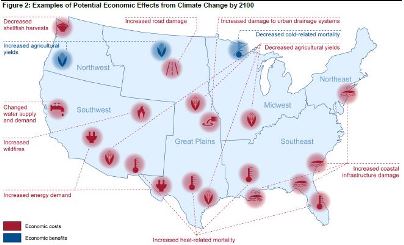GAO Estimates Benefits of Preparing USA for Climate Change
The study estimated coastal property losses from rising seas and more frequent, more intense storms could range from $51 billion to $74 billion per year late in this century.
The U.S. Government Accountability Office (GAO) has issued a report that estimates benefits of significant actions to address climate change. The study estimated coastal property losses from rising seas and more frequent, more intense storms could range from $51 billion to $74 billion per year late in this century, for example, and potential cost savings are available across many sectors, from health care to infrastructure and agriculture.
 The report is addressed to U.S. Sen. Maria Cantwell, D-Wash., ranking member on the Senate Energy and Natural Resources Committee. She and Sen. Susan Collins, R-Maine, had requested the report, and Cantwell noted that it says the economic cost of climate change to the United States is likely tol exceed $300 billion this year alone, after a series of damaging hurricanes hit the Gulf Coast, Florida, and Puerto Rico. By 2039, climate change will cost U.S. taxpayers more than $1 trillion, she said.
The report is addressed to U.S. Sen. Maria Cantwell, D-Wash., ranking member on the Senate Energy and Natural Resources Committee. She and Sen. Susan Collins, R-Maine, had requested the report, and Cantwell noted that it says the economic cost of climate change to the United States is likely tol exceed $300 billion this year alone, after a series of damaging hurricanes hit the Gulf Coast, Florida, and Puerto Rico. By 2039, climate change will cost U.S. taxpayers more than $1 trillion, she said.
The report, titled "Climate Change: Information on Potential Economic Effects Could Help Guide Federal Efforts to Reduce Fiscal Exposure," recommends that the federal government utilize available information on the potential economic effects of climate change to help identify significant climate risks and develop appropriate federal responses.
"My colleagues no longer have to take it from me—the Government Accountability Office tells us climate change will cost taxpayers more than a half a trillion dollars this decade, and trillions more in the future unless we mitigate the impacts." Cantwell said.
"We cannot ignore the impact of climate change on our public health, our environment, and our economy," Collins added. "This nonpartisan GAO report Senator Cantwell and I requested contains astonishing numbers about the consequences of climate change for our economy and for the federal budget in particular. Our government cannot afford to spend more than $300 billion each year in response to severe weather events that are connected to warming waters, which produce stronger hurricanes. In Maine, our economy is inextricably linked to the environment. We are experiencing a real change in the sea life, which has serious implications for the livelihoods of many people across our state, including those who work in our iconic lobster industry. I hope the release of this analysis will cause all of us to think more broadly about this issue, take a harder look at the economic consequences of inaction, and use what is known about climate risks to inform federal policy."